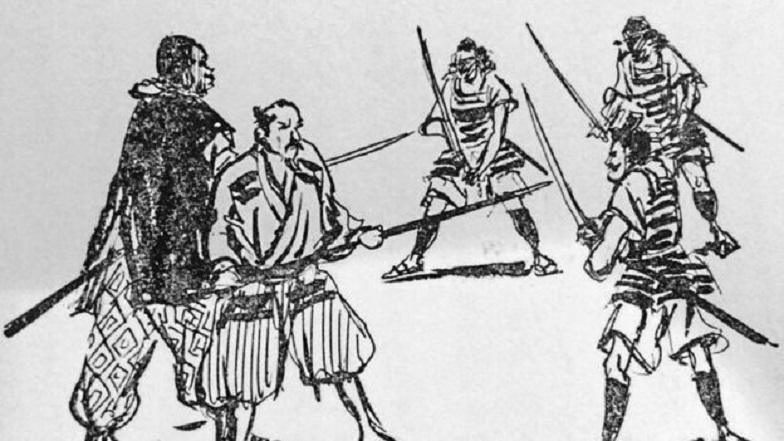Almost 500 years ago, a very tall man, Yasuke, from Africa arrived in Japan. He became the first foreign-born man to obtain the status of a samurai warrior. His story inspired two Hollywood-produced films.
Known as Yasuke, this man was a warrior who reached the rank of samurai under the reign of Oda Nobunaga, a powerful Japanese feudal lord of the sixteenth century who was the first of three unifiers of Japan.
In 1579, his arrival in Kyoto, the capital at the time, caused such a sensation that people jostled to see him and some even died crushed in the crowd, according to the historian Lawrence Winkler. In less than a year, Yasuke had joined the upper echelons of the class of Japanese warriors, the samurai.
Shortly after, he spoke Japanese fluently and was fighting alongside Nobunaga. “His height was 6 shaku 2 sun (about 1.88m) … he was black, and his skin was like charcoal,” another samurai, Matsudaira Letada, described it in his diary in 1579. The average size of a Japanese in 1900 was 1m57, so Yasuke would have dominated most of the Japanese in the 16th century. At the time, people were generally smaller because of a poor diet.
Making a warrior
There is no record of the date or country of birth of Yasuke. Most historians say it came from Mozambique, but some have suggested other countries such as Ethiopia or Nigeria. What is known, however, is that Yasuke arrived in Japan with an Italian Jesuit named Alessandro Valignano during an inspection visit, and only appears in history between 1579 and 1582. Some experts say he was a slave, but it’s hard to prove.
Floyd Webb and Deborah DeSnoo, filmmakers working on a documentary about him, believe that the claims that he was a slave are at best speculations. “It would have been impossible for Yasuke to become a samurai in just one year without a warrior past,” said Ms. DeSnoo. Samurai have often started their training since childhood.
Friendship with the Lord of War
Yasuke met Nobunaga soon after his arrival in Japan, and he was interested, say the filmmakers, being a talented debater. Yasuke already spoke a little Japanese, and the two men got along well, according to academic Thomas Lockey, who wrote a book about Yasuke.
According to Mr. Lockey, Yasuke entertained Nobunaga with tales from Africa and India, where Mr. Lockey thinks Yasuke had spent some time before going to Japan. Mr Webb believes that because of his command of the Japanese language, Yasuke already had a favorable outlook. “He was not like the Jesuits, who had a religious program in Japan,” says Webb.
According to reports, Nobunaga asked his nephew to give Yasuke money at their very first meeting. The Franco-Ivorian writer Serge Bile was so intrigued by the extraordinary rise of Yasuke that he wrote a book about the warrior. “This is part of the mystery surrounding this character, which is why he fascinates me,” he told the BBC.
The African warrior and the Japanese warlord had a lot in common. Nobunaga was a big fan of martial arts and spent a lot of time practicing them. He was also an eccentric who, according to Webb, often dressed in the West and sought the company of very disciplined and intelligent people.
“Yasuke carried the warrior spirit,” says Webb. He understood the cultural language of Japan and loved to dance and interpret Utenzi – a traditional form of Swahili narrative poem celebrating heroic deeds, Webb adds. This suggests that Yasuke may have originated from Mozambique, as some historians believe since Swahili is still spoken in some parts of the north of the country.
Similarly, Nobunaga was a lover of the Noh Theater – a form of Japanese classical musical drama – and it is widely reported that he was a patron of the arts. Nobunaga became attached to Yasuke and treated him as a member of his family. The African was part of a very selective group of people allowed to dine with him. “Nobunaga praised Yasuke’s strength and stature, describing his power as that of 10 men,” says Ms DeSnoo.
When Nobunaga conferred the rank of samurai to Yasuke, the idea of a non-Japanese samurai had never been heard. Later, other foreigners will also get the title. As the first foreign-born samurai, Yasuke has fought famous battles alongside Oda Nobunaga. He was also present on the fateful night when one of Nobunaga’s generals, Akechi Mitsuhide, turned against him and set fire to the palace of the warlord, trapping Nobunaga in one of the rooms. Nobunaga put an end to his life by making a seppuku, a ritual suicide.
Before committing suicide, he asked Yasuke to behead him and carry his head and sword to his son, according to historian Thomas Lockley. It was a sign of great confidence. The legend of Yasuke ends shortly after, in 1582. The fall of Nobunaga in the hands of a treacherous general resulted in the exile of the first black samurai, perhaps returning to a Jesuit mission in Kyoto.
Although his fate and the last years of his life remain unknown, Yasuke has lived in the imagination of many Japanese who grew up with Kurusu Yoshio’s award-winning Kuro-suke (kuro meaning “black” in Japanese) children’s book.
The book, which dramatizes Yasuke’s life, ends on a bittersweet note: after Nobunaga commits suicide, Kuro-suke (Yasuke) is taken to a temple where he dreams of his parents in Africa and cries. The entertainment industry newspaper Variety reported in May that Black Panther actor Chadwick Boseman would play Yasuke in an upcoming feature film. It will be the second Hollywood film currently under development on Yasuke’s life.
In 2017, Hollywood studio Lionsgate announced that it was developing a movie about the life of the black samurai. Nearly 500 years later, his extraordinary journey continues to amaze and inspire people.
